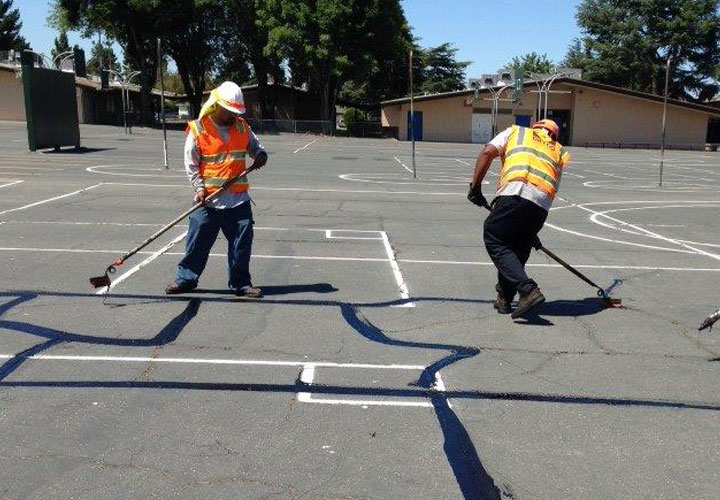Unleash the Potential: Regrading and Asphalt Sealing for Business Rooms
Unleash the Potential: Regrading and Asphalt Sealing for Business Rooms
Blog Article
Warm Mix Asphalt: A Sustainable Remedy for Sidewalk
Warm Mix Asphalt (HMA) has actually arised as a leading sustainable option for pavement solutions, offering a myriad of cutting-edge modern technologies and ecological benefits. Its capability to recycle materials and lower power usage provides a compelling instance for its fostering in roadway building and construction jobs. The lasting efficiency and sturdiness of HMA make it a favored choice for infrastructure development. As the need for environmentally friendly building practices expands, checking out the nuances of HMA's sustainability can offer beneficial understandings into the future of sidewalk options.
Ecological Advantages of Warm Mix Asphalt

Furthermore, Warm Mix Asphalt helps to minimize urban warm island effects. Its dark shade soaks up sunlight, lowering the amount of heat reflected back into the ambience contrasted to lighter-colored pavements. This can reduce ambient temperatures in metropolitan locations, decreasing the need for air conditioning and eventually reducing energy intake.
In enhancement, Warm Mix Asphalt adds to enhanced stormwater monitoring. Its permeable nature allows water to infiltrate the pavement and recharge groundwater supplies, decreasing runoff and the risk of flooding. These environmental benefits make Hot Mix Asphalt a sustainable selection for paving roads and highways.
Energy Efficiency in HMA Production
Is energy performance an essential element in the production of Hot Mix Asphalt (HMA)? Power plays a substantial function in the production of HMA, affecting both price and ecological sustainability. One crucial element of energy performance in HMA production is the use of warm mix asphalt (WMA) modern technologies.
Moreover, developments in plant technologies have actually brought about even more energy-efficient HMA production procedures. Modern plants are created with features like recycled asphalt sidewalk (RAP) handling abilities, efficient heater systems, and improved insulation, all adding to energy cost savings. By maximizing energy use in HMA production, the sector can lower its carbon footprint while keeping top notch pavement products. Power effectiveness is, for that reason, a crucial factor to consider in ensuring the sustainability of Warm Mix Asphalt manufacturing.
Recyclability of Warm Mix Asphalt
The recyclability of Warm Mix Asphalt (HMA) is an essential aspect of its sustainability and long-lasting ecological influence. HMA is just one of the most recycled products in the USA, with over 100 million bunches of reclaimed asphalt pavement (RAP) being reused yearly in brand-new pavement building and construction. Recycling HMA provides a number of environmental advantages, such as minimizing the need for virgin materials, reducing energy usage throughout manufacturing, and lowering the quantity of waste sent to landfills.
The procedure of reusing HMA includes grating the existing sidewalk, squashing it right into smaller pieces, and blending it with brand-new accumulation and asphalt binder to create a recycled mix. This recycled mix can often do along with or perhaps better than traditional HMA, while calling for less resources and creating reduced greenhouse gas exhausts. By including RAP into new pavement jobs, road companies can save natural deposits, minimize expenses, and lessen the environmental footprint of road construction and maintenance tasks. On the whole, the recyclability of HMA plays a substantial function in advertising sustainable methods within the pavement industry.

Long-Term Performance of HMA
Asphalt pavements show sturdiness and durability over an extensive period, mirroring the long-lasting efficiency of Warm Mix Asphalt (HMA) Additionally, developments in HMA technology, such as the use of polymer-modified binders and cozy mix asphalt, have further improved the toughness and durability of HMA sidewalks. By prioritizing high quality building and upkeep techniques, HMA continues to confirm itself as a economical and sustainable service for lasting pavement facilities.

HMA: Longevity and Sustainability
Showing both longevity and sustainability, Hot Mix Asphalt (HMA) has become a keystone in the building of long-lasting sidewalk facilities - commercial parking lot paving. HMA's durability originates from its capability to withstand heavy lots, extreme weather, and high traffic quantities, making it a trusted option for streets, freeways, and flight terminal paths. The composition of HMA, which normally consists of aggregates, binder, and filler, plays an essential duty in enhancing its long life and resistance to wear and tear
In addition, HMA's sustainability depends on its find out recyclability and energy-efficient link manufacturing procedure. The ability to reuse redeemed asphalt sidewalk (RAP) in new HMA mixtures minimizes the need for virgin materials and reduces the ecological influence of sidewalk construction and maintenance. In addition, the power efficiency of creating HMA exists in its lower blending temperature levels contrasted to other pavement materials, causing decreased power intake and greenhouse gas exhausts.
Conclusion
Finally, warm mix asphalt (HMA) supplies a lasting solution for pavement with its environmentally friendly attributes. HMA's recyclability, energy efficiency in production, and long-term sturdiness make it a green selection for road construction. By saving natural deposits, lowering waste, and reducing greenhouse gas exhausts, HMA plays an essential duty in advertising sustainability in facilities advancement. Its capability to alleviate urban warm island impacts additionally highlights its significance in creating durable and environmentally mindful pavement systems.
HMA is one of the most recycled products in the United States, with over 100 million lots of reclaimed asphalt sidewalk (RAP) being reused each year in brand-new sidewalk construction.The process of reusing these details HMA includes milling the existing sidewalk, crushing it into smaller items, and mixing it with brand-new aggregate and asphalt binder to develop a recycled mix.Asphalt pavements demonstrate longevity and resilience over an extended duration, reflecting the long-lasting efficiency of Hot Mix Asphalt (HMA) Additionally, innovations in HMA technology, such as the usage of polymer-modified binders and warm mix asphalt, have better improved the durability and durability of HMA sidewalks. The capacity to reuse redeemed asphalt pavement (RAP) in brand-new HMA combinations decreases the demand for virgin products and decreases the environmental influence of pavement building and construction and upkeep.
Report this page